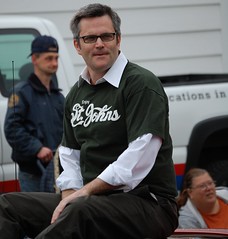Local politics, particularly in a liberal city like Portland, are not a localized version of the national scene. There is not a labor/business split in our governing bodies, for example, and nary a Republican in sight serving in any significant local public office.
The historic split in municipal politics has come between real estate developers, who want to maximize the value of their land by increasing density, and those who have stood in their way: neighborhood preservationists and environmentalists.
Siding with the developers, you often find labor, since commercial real estate development usually means union jobs.
But a funny thing happened on the way to global warming. The developers managed to co-opt environmentalists with the idea of “smart growth.” Without the environmental movement in their way, the developers now have virtual carte blanche to run things as they please.
One of the only constituencies left in opposition to this juggernaut are those who oppose gentrification and favor rent controls, that is, people who are virtually powerless by definition.
There’s also the business constituency, relatively weak in Portland compared to other big cities, which takes issue with using tax revenue to subsidize anything, except maybe parking. But they don’t object to gentrification, since it tends to grow markets for the goods and services they sell.
To be clear, I like the ideas of limiting sprawl, preserving green spaces, and developing housing near employment. But the “sustainable” label has been used and abused beyond recognition in Portland. We’ve significantly over-built condos in the central city, publicly subsidized to the tune of millions of dollars annually with a streetcar system that does not solve any identifiable transportation problem and an aerial tram to no place in particular.
Additionally, the “sustainable development” crew has pushed “skinny lots” in our core residential neighborhoods, and multi-story condo developments in our distributed town centers, like Belmont, Hawthorne, Alberta, and now Interstate and Mississippi. All of this is predicated on the notion that we’ve already maxed out our available housing stock, and must choose between building up or building out.
People who object to having a nine-story condo building towering over their back yards obviously don’t understand that we’re going to have 300,000 new residents in Portland, Real Soon Now.
That’s the canard that’s repeated ad nauseum and without qualification or any sense of irony by the candidates who represent big developers. Oh, they’re coming, whether we like it or not, they assure us, and we better make sure we build up rather than out to accommodate them.
So commercial real estate developers not only get to maximize their land values by increasing density under the cloak of “sustainability,” they’re given significant public subsidy to do so.
And what about the “G” word? Yes folks, “smart growth” is progressively gentrifying every neighborhood in Portland’s residential core. This isn’t very “smart” if you, like me, value the diversity of your neighborhood.
And that brings us to what’s wrong with the Mayor’s race in Portland. You’ve got Sam Adams, unabashedly pushing the big developer’s agenda, and Sho Dozono unabashedly pushing the big business agenda (criticizing Adams for opposing Wal-Mart).
But this is a false dichotomy, since they both essentially represent big money. Neither candidate says “boo” about rent stabilization, preserving affordable housing (as opposed to building it per the big developers’ “smart growth” vision) or preserving the historic quality of our neighborhoods.
Both, of course, are “green” candidates, as is virtually every candidate running for city office (Mike Fahey nothwithstanding). But neither of them seems to have much interest in affordable housing.
At yesterday’s North Portland Candidates’ Forum, Adams went so far as to say North Portland has too much affordable housing, a reference to all the public housing on the Peninsula. Which could be taken as thinly-veiled racism.
It could also be construed as missing the point, since it isn’t just the poor and working poor who struggle with housing prices in Portland, but increasingly two-income, middle class families.
At least in the council races, there are a couple candidates who will speak earnestly about issues of housing and gentrification.
For seat #2, being vacated mid-term by Erik Sten, Ed Garren has been the only candidate to actually talk about rent control. Nick Fish talked about “fixing the roof before putting in a jacuzzi” at yesterday’s forum, which is nice. But Jim Middaugh, Erik Sten’s chief of staff, mostly wanted to remind us of those 300,000 people moving here. (Sure, Middaugh talks a good game on his campaign Web site, but I can’t get over the feeling that it’s just boilerplate. He wanted to talk a lot more about those 300,000 new residents yesterday than the communities displaced by the City Hall business as usual his candidacy represents.)
Likewise John Brannam, running for seat #1, who was the first to intone the 300,000 figure at yesterday’s forum. We all know where Chris “streetcar” Smith stands, of course, so much so that he doesn’t even have to speak of the 300,000 promised ones.
In his Willamette Week endorsement interview, Smith talked of replicating the kind of development supported by the central city streetcar loop on the east side. Yes, folks, condos and streetcars for all your friends! To Gresham with the unwashed masses! Let them ride MAX! Somehow, Smith thinks we can cut our carbon footprint in half by pushing all the po’ folks to the margins of our metro area. Well, maybe he doesn’t really think it through that far. But that’s the upshot of gentrifying our close-in neighborhoods with the kind of development he champions.
Amanda Fritz and Charles Lewis stand out as candidates for seat #1 who want to focus on neighborhoods. Lewis had the audacity yesterday to speak of affordable housing (gasp!), and Fritz has been steadfast in her advocacy for shifting the city’s budget priorities to basic services in the neighborhoods. (I’ve already endorsed Fritz for this seat.)
So our Portland body politic is divvied up into a handful of sometimes-overlapping camps, with an overarching “sustainable” umbrella big enough to offer refuge to all kinds of scoundrels. (“Sustainability” is to Portland politics what patriotism is to national politics.)
Dozono is alone in his big retail fealty, but Sam Adams has good company in the real estate developers’ court with Jim Middaugh and Chris Smith.
Those seeking to preserve the character and livability of neighborhoods, affordable family housing, and communities of color are harder to come by, and they aren’t going to have any mayoral coattails to ride this election season. Ain’t it a shame?














